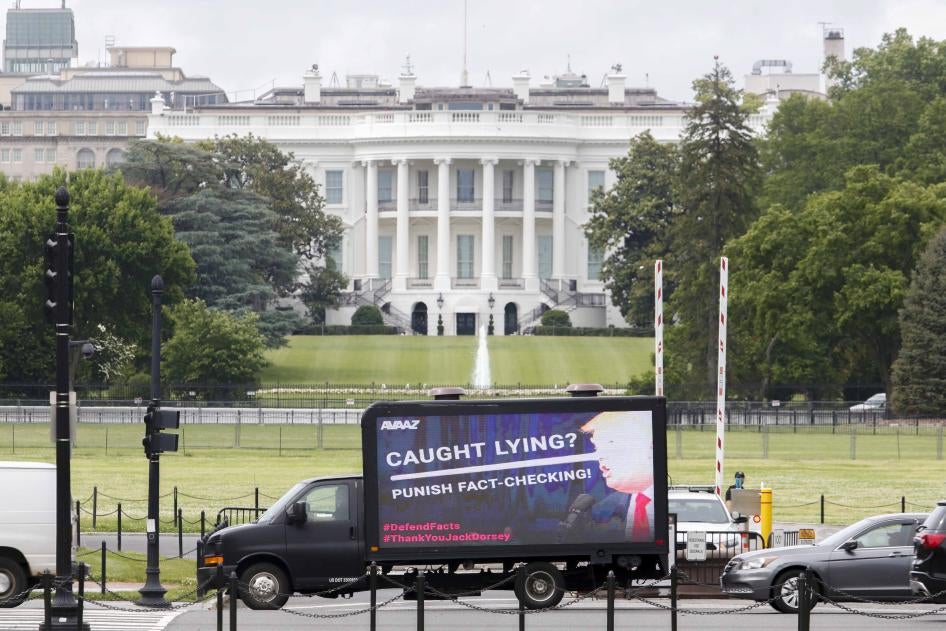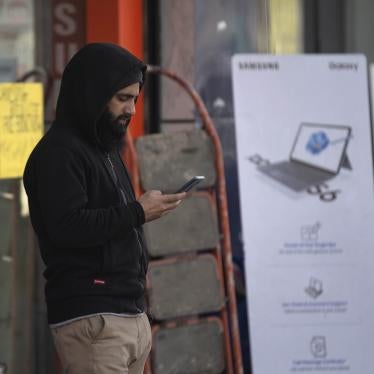(Washington, DC, May 29, 2020) – President Donald Trump’s May 28, 2020 executive order, Preventing Online Censorship, is a profound attack against online freedom of expression globally, Human Rights Watch said today.
The executive order aims to make the social media companies’ general protection from liability under Section 230(c)(1) of the Communications Decency Act contingent on whether they moderate content in “good faith,” a standard the Federal Communications Commission would be asked to clarify. The executive order would potentially remove these legal protections and threaten social media companies with a flood of litigation if they try to moderate what gets posted on their platforms in some fashion the executive branch deems is not in “good faith.”
“President Trump’s executive order amounts to a threat to punish social media platforms and the people who post on them because the government might disagree with the way the companies moderate content,” said Deborah Brown, senior digital rights researcher and advocate at Human Rights Watch. “It appears to have been motivated by Twitter’s decision to place a fact-check label on President Trump’s tweet saying mail-in ballots are ‘fraudulent.’”
In addition to misreading the act’s protection against liability for content hosted by internet intermediaries, like social media companies, the executive order would prohibit federal spending, marketing, or advertising on platforms the government deems to “restrict free speech” and directs regulators and prosecutors to examine the practices of sites like Twitter and Facebook to judge whether they are deceptive or unfair. The executive order will likely be challenged in court.
Coming just days after Twitter fact-checked the president’s false claims about mail-in voting and election fraud, the executive order states that online platforms are “engaging in selective censorship that is hurting our national discourse.” This builds on years of accusations that social media platforms are biased in how they moderate and remove content. These accusations range from being anti-conservative to favoring elites and governments over grassroots activists and racial minorities.
Section 230 of the Communications Decency Act protects internet intermediaries, like social media platforms where users post content, from liability for content that their users post to their sites. It separately protects these companies from liability when they enforce policies on their platforms, such as take-downs, comments, or labeling of objectionable third-party postings. This allows them to take steps to combat mis- and disinformation, hate speech, terrorist content, and other forms of online speech that are illegal or that violate their terms of service or community guidelines.
Social media giants in many ways mimic the public square, and have a responsibility to be more transparent and accountable on how they moderate content and what procedural safeguards they put in place against arbitrary censorship. There is a strong public interest in knowing what public figures – including government leaders – say and do, and companies are clearly struggling to find the right balance when what public figures do on their platforms threatens the rights of others through incitement or falsehood. As global actors, companies should align their terms of service and community guidelines with international human rights standards.
“There is plenty of controversy surrounding what these companies allow and disallow on their platforms. But stripping platforms of their immunity from liability is not the answer,” Brown said. “On the contrary, it will result in more censorship and give political leaders around the world license to demand that platforms regulate content according to their preferences.”








